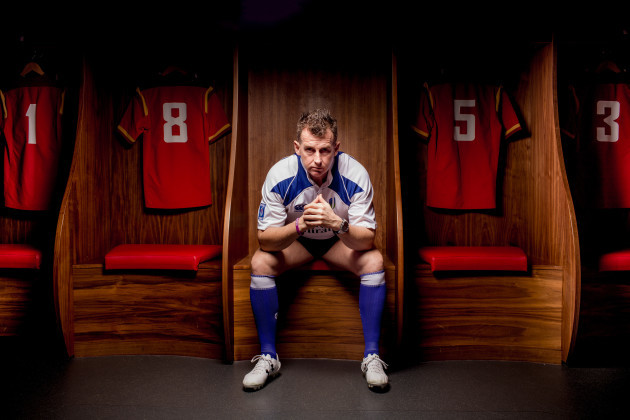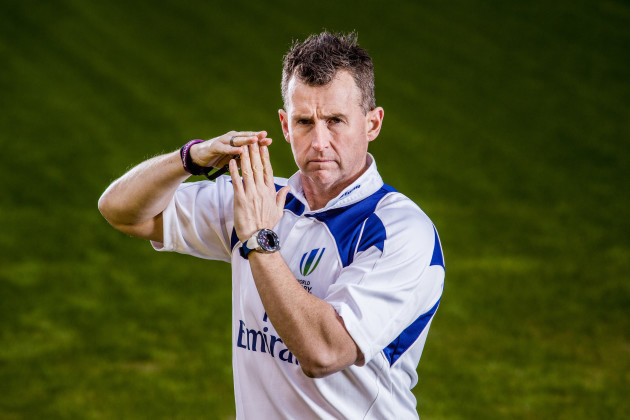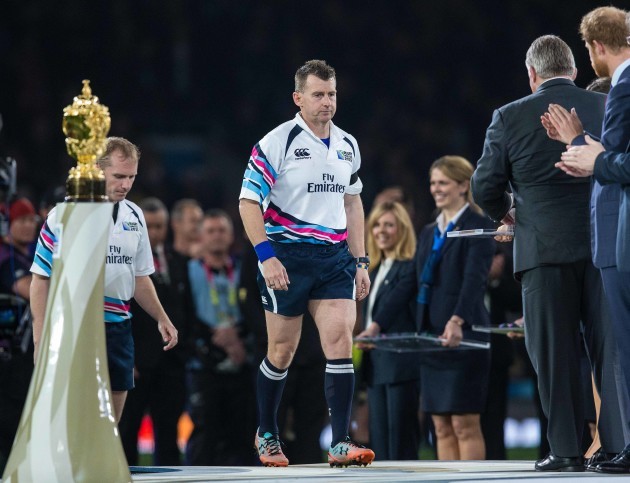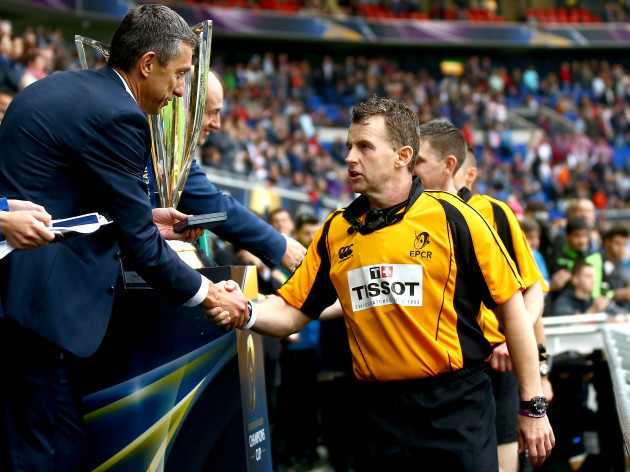NIGEL OWENS TELLS a great story about the first time he refereed a senior club game in Wales.
The year was 1987 and Owens was just 16-years-old when Ally West put him down to officiate his first game in Tregaron, a 90-minute drive away from his hometown of Mynyddcerrig.
This presented Owens with a major problem. He was too young to drive and his father, Geraint, could only bring him on short journeys near the family home.
The only time Geraint had attempted use the dual carriageway before, he drove down the wrong way and was fortunate to get away unscathed. It wasn’t worth the risk.
“Don’t worry,” West said. “I’ve sorted it out. You can go with the away team on the bus.”
So off Owens went to the game with the away side. He asked the bus driver to drop him off half a mile away from the club and he made his own way to the grounds from there.
The game was tied at 6-6 when Owens awarded a last-minute penalty to the away team. They scored it to seal a narrow victory.
Owens was back in his changing room getting togged-in when the captain of the victorious away side shouted from around the corner.
“Nige, come on,” he roared. “The bus is ready!”
As the teenager walked towards the bus, the home players had their faces pressed against the dressing room windows sticking two fingers up and shouting profanities at him.
“I come from a different background of rugby,” Owens tells The42. “Welsh rugby is different to a lot of other places.
“The one that’s quiet similar to Wales is Munster, because they are very different to other places like Scotland, the rest of Ireland and England where it’s been a middle-class, upper-class game over the years.
“In Wales it’s always been a working class game and the same goes for Munster I guess.”
Owens recalls his first occasion refereeing in England and he immediately noticed how interactions with the players was different to what he was used to.
“When I was coming through the refereeing ranks in Wales, you’d never hear a player call you ‘sir.’ Very, very rare.
“I remember the first time I went on an exchange to referee a game in England when I was about 20.
“All the players were calling me ‘sir’ and I felt very uneasy at it. ‘Don’t call me sir, I’m not a teacher.’ It was something very strange.
“Players still call you ‘sir’ now and you come across them over years calling you ‘sir.’ On the most part, I’ve never been used to players calling me ‘sir’ because in Wales they didn’t do it.
“They called you a lot of other things, but they didn’t call you ‘sir’! Although they were all still very polite.”
Owens started refereeing full-time in 2001, six years after the game turned professional, and went on to enjoy an illustrious career in the middle. He took charge of the 2015 Rugby World Cup final and is widely regarded as one of the finest officials in the game.
He’ll take charge of Ireland-France in Aviva Stadium on 25 February and admits it’s a very different game to officiate now compared to the amateur days of the past.
“The travelling involved now is huge. Very rarely I’m home on weekends. Whereas when I was reffing in the amateur era you’d be home pretty much every weekend and you’d get a couple of trips away during the season.
“Now it’s the other way around because there’s so many games. It would be very difficult for you if you’re not a full-time referee unless you’re very lucky in your job to get all this time away.”
“The main thing is the pressure on you now in the modern game. The way the game is now, pretty much every game I referee is televised live and scrutinised. Every decision you make is looked at again by 20 to 30 different cameras, so there’s no hiding place anymore.
“The pressure on you as a referee now is massive, it’s huge. When you refereed years ago, if you made a mistake and the game wasn’t on TV nobody apart from somebody at the game knew you made a mistake. If you make a mistake now everybody, including the players, know within a couple of seconds.”
Criticism on social media is part of the modern game but Owens, who is very active on Twitter, has no issue in firing back if he feels hard done by.
“I use social media and if you can’t deal with the pressure of social media my best advice is don’t be on it. There is no hiding place from it anymore.
“I don’t go reading through social media to see if I got a decision right or wrong. Things will come up on your timeline and you’ve just got to rise above that. Sometimes their opinions are valuable and right – you may have got something wrong.
“You’ve got to deal with that as a referee. I do like a good debate because you learn a lot sometimes from other people’s opinions. Sometimes I’ll have a conversation with somebody on social media and tell them my view. Sometimes the both of us are not right and the both of us are not wrong.
“The thing I don’t have much time for are the ones that hide behind a fake name or a rugby shaped ball and are very happy to abuse anybody on there. Those are the people I don’t have time for.
“The people whose name and picture is there and gives their view, I’ve respect for them whether I agree with them or not.”
The 45-year-old has developed a cult-hero status among rugby fans for his delivery of comedic one-liners during games. He famously told fly-half Treviso Tobie Botes “this is not soccer” during a game against Munster in 2012.
“It’s probably highlighted now when it goes viral with social media and the TV picking stuff up. I’ve always been that type of character. I was on stage doing stand-up comedy at 14. I was doing comedy a long time before I went into refereeing.
“When I do after dinner speaking at rugby clubs and see some of the players or referees from 25 or 30 years ago, when I was a kid coming through the system.
“Some of them will tell me a few stories when they remember me reffing back years ago and I said something (funny) which I’d forgotten about. It’s always been there I guess.
“I don’t go out on the field to have or force the banter. I just be myself and I say it as it is in the moment what I feel needs to be said. It’s nothing that’s prepared, it’s just the way my personality is really.
“That’s the way I am on and off the field. There’s a time and place for it as well – you don’t go onto the field just to say something for the sake of it, I just say it because that’s what I think needs to be said at the time.”
Tissot launched the #RespectTheRef campaign for the RBS 6 Nations Championship in partnership with Welsh international rugby union referee Nigel Owens.
The42 is on Instagram! Tap the button below on your phone to follow us!




